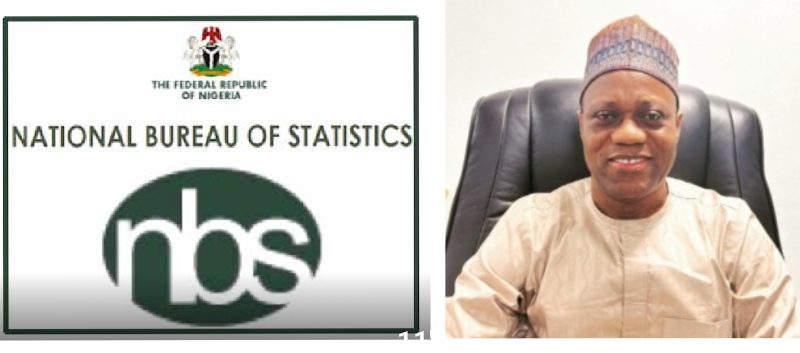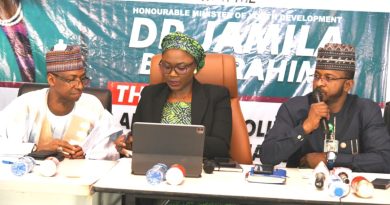NIGERIA’S LABOUR FORCE IN FOCUS: NBS Publishes 2023 Annual and Q1 2024 Labour Force Survey Results
Oru Leonard
The National Bureau of Statistics (NBS) published the 2023 Annual and Q1 2024 Nigeria Labour Force Survey (NLFS) results today. These reports provide a comprehensive picture of Nigeria’s labour market performance for the full year 2023 and the first quarter of 2024, offering vital insights into key labour market indicators.
The release of the 2023 annual report marks the first of its kind, conducted in line with the International Labour Organisation (ILO), guidelines between the 4th Quarter of 2022 and the 3rd Quarter of 2023. The findings offer detailed state-level data on critical labour market indicators such as unemployment, underemployment, wage employment, informal employment, and youth participation in education, employment, or training.
Highlights of the 2023 Annual Report of the NLFS
Working-age population: The working-age population in the year 2023 was 116.6 million, representing 53.8% of the total population. Women accounted for 52% of this population, with men at 48%.
Labour force participation rate: The annual Labour Force Participation rate was 76.3%, equivalent to 88.9 million individuals. Bauchi State recorded the highest participation rate at 92.3%, while Ekiti State had the lowest at 63.4%.
Employed population: Of the total working-age population in 2023, 84.1 million individuals were employed, including 20.6 million persons between the ages of 15 and 24.
Employment-to-population ratio: In 2023, the national employment-to-population ratio was 72.2%, with rural areas (77.3%), significantly outperforming urban areas (68.7%). Bauchi State had the highest employment-to-population ratio at 88.4%, while Rivers State recorded the lowest at 55.7%. By sex, the EPR was 73.7% for males and 70.7% for females.
Informal Employment: In 2023, 77.6 million individuals, were engaged in informal employment, accounting for 92.2% of the employed population. Kano State had the highest number of informal workers, with about 5.2 million individuals engaged in informal employment, followed by Lagos State with 4.6 million people (excluding agriculture).
Unemployment rate: The headline unemployment rate at the national level was 5.4% in 2023. At the state level, Abia recorded the highest unemployment rate at 18.7%, while Nasarawa had the lowest at 0.5%.
Unemployment by Educational Status: In terms of educational attainment, the unemployment rate was highest at 9.4% among persons with post-secondary education. This was followed by those with secondary education at 6.7%, and those with primary education at 4.1%. The rate was lowest for those with no formal qualification at 3.2%.
Time-related Underemployment: National time-related underemployment stood at 11.1%, with 8.3% for men and 13.4% for women. Plateau State had the highest time-related underemployment at 33.9%, while Nasarawa recorded the lowest at 0.3%.
Youth not in employment, education, or training (NEET rate): The Youth NEET rate was 15.6%, with Abia State recording the highest NEET rate at 38.1% and Zamfara State the lowest at 4.5%.
HIGHLIGHTS OF Q1 2024 LABOUR FORCE SURVEY
Labour force participation rate: In Q1 2024, the labour force participation rate among the working-age population declined to 77.3% in Q1 2024, from 79.5% in Q3 2023.
Employment-to-population ratio: The employment-to-population ratio was 73.2% in Q1 2024. This is a decrease of 2.4 percentage points compared to a ratio of 75.6% in Q3 2023.
The ratio in urban areas was 69.5% and 78.9% in rural areas in Q1 2024. This is a decrease in the ratio compared to the 71.1% and 80.7% in Q3 2023, respectively.
Wage employment: The proportion of workers in wage employment rose to 16.0% in Q1 2024, a 3.3 percentage point increase from 12.7% in Q3 2023. By gender, 20.1% of males were in wage employment, compared to 12.1% of females. Wage employment was also higher in urban areas, at 21.8% than in rural areas, where it stood at 8.1%.
Unemployment rate: The unemployment rate increased to 5.3% in Q1 2024, from 5.0% in Q3 2023. By place of residence, the rate was 6.0% in urban areas and 4.3% in rural areas for Q1 2024.
Unemployment by Educational Status: Unemployment based on educational attainment shows that the unemployment rate among persons with post-graduate education was 2.0%, 9.0% among those with post-secondary education, 6.9% for those with secondary education, and 4.0% among those with primary education in Q1 2024.
Youth Unemployment: The unemployment rate among youth aged (15-24 years) was 8.4% in Q1 2024, a decrease of 0.2% compared to Q3 2023 (8.6%).
Time-related underemployment: Time-related underemployment in Q1 2024 was 10.6%, showing a decrease of 1.7% from the rate of 12.3% recorded in Q3 2023.
Youth not in employment, education, or training (NEET rate): The percentage of youth not in education, employment, or training (NEET rate) was 14.4% in Q1 2024, showing a 0.7 percentage point increase from 13.7% in Q3 2023. The results also showed a higher NEET rate among females at 15.9%, compared to 13.0% for males in Q3 2023.
Number of Hours Worked: Nationally, 1.5% of employed Nigerians spent between 1-9 hours in a week, 4.8% spent between 10-19 hours in a week, approximately 25% worked between 20-39 hours, 22% between 40-48 hours, and the 46% worked 48hours and above in a week.
Both reports, with further details and insights, are available on the NBS website at www.nigerianstat.gov.ng. The microdata from the survey will also be published and accessible through the National Data Archive (NADA), on the NBS website.
According to a statement signed by the Director of Communications and Public Relations, Mr S. J Ichedi, both reports, with further details and insights, are available on the NBS website at www.nigerianstat.gov.ng. The microdata from the survey will also be published and accessible through the National Data Archive (NADA) on the NBS website.
The NBS remains committed to providing accurate and timely data to inform policy decisions and drive sustainable development.
For questions, comments, or inquiries, please email: feedback@nigerianstat.gov.ng or visit the live chat on the NBS website, You can also contact Bakare Saheed @ 08169511812.




